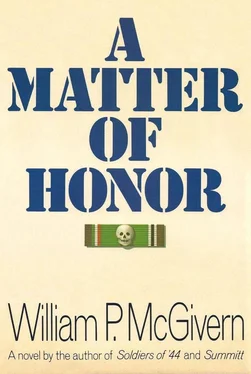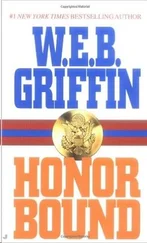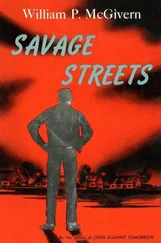He stood at the windows, back to the door, waiting for the knock. When he opened it, the man from the Hutten-Bar was standing there, liquor tray in hand, the airline ticket on the tray.
“Do you mind if I come in?” he said.
“I sure as hell do,” Weir answered. “If you’re selling anything, whether it’s black market currency or young girls or their brothers, I’m not buying.”
“Come now, general,” the man said. “I know you spotted me at least once this morning and I have a notion you’ve been on to me for some time, so I bribed room service to let me bring up your order. May I put it down somewhere?” He nodded down at the tray. “Johnny Walker Black. You’re a thoughtful host.”
“On the bureau then,” Weir said. “And you must let me reimburse you for that bribe. Or is that an expense account item?”
The man put up a hand in mock protest.
“Please, general. My pleasure.” He picked up the airlines envelope and handed it to Weir. “It’s all in order, I’ve checked it. Munich departure nine o’clock, arrival at Kennedy, transfer to American for Chicago, then a twelve-seater down to Springfield in time for supper tomorrow night. The concierge put in the voucher for the ride to the airport. It’s all there.”
The man looked around the hotel room, checking the windows, glancing toward the bathroom. “I’ve called the home office. My people want you aboard Flight 257 and my orders are to stick with you till you’re emplaned.”
He put out his hand. “I’m Lenox Riley. I’d like our few hours together to be as pleasant as possible.”
“There’s no need to introduce myself,” Weir said dryly. “You seem to know everything about me. But I’ll tell you what, Riley, I’ll buy the drinks if you’ll tell me how you got onto me. Scotch all right? I could send down for wine...”
“Scotch will do nicely,” Riley said. He removed his topcoat and dropped it over the arm of a chair. “Easy on the soda and a single ice cube.”
“Hell, every time I’m pressed into service as a bartender I either make it too light or too heavy. Mind serving yourself?”
The general walked to the windows, humming, pretending to savor the sight of the lights twinkling beyond the darkened windows. In the reflection of a pane he watched Riley half fill a glass with Scotch, then take a long swallow from it, adding another ounce of liquor before lopping it with soda and an ice cube.
“I’ll make my own, thanks,” the general said and walked to the bureau.
“This is a rare, on the job treat for me,” Riley said. “If I drank like this all the time I’d have a liver the size of a coconut.”
“Christ, enjoy yourself. It’s the only way to relax after a hard day.” Weir lifted his glass. “Cheers.”
“Cheers,” Riley said but set down his glass. He walked to the closets, opened them and ran a hand along the empty metal hangers. He pulled open each bureau drawer and searched them. He went into the bathroom, kicking the door wide open, then checked the medicine cabinet. He noticed the wet swim trunks hanging from the doorknob.
“Forget something?” he asked.
“No. I’m not taking them. I don’t want wet luggage at thirty thousand feet.”
The man opened the suitcase on the bed and felt through the layers of clothing. Then he picked up his drink, placed the straight-backed desk chair between Weir and the hall doorway and straddled it. “You’re a neat packer,” he said. Weir nodded.
“Before we start enjoying ourselves too much,” Riley said, “I’d like to inform you that I’m armed at the moment with a .38 special, Smith and Wesson, for which I carry a German license, and like you, Weir, I’m karate trained.”
Weir nodded again without interest.
“You look CIA, Riley,” the general said flatly, “but I can think of no reason they’d have an interest in me.”
“At the moment I’m an independent, though I still have a classified number in Langley and an operator who’ll take a signal. It’s one of your own confreres who asked me to keep an eye on you, general. There’s no need to be secretive about it now.”
Weir felt a jolt of anger and satisfaction. “How did Colonel Benton know I’d left the Greenbrier?”
“For about twelve hours, he didn’t,” Riley said. “Fortunately Captain Jetter is a light sleeper. When he finally realized you’d given him the slip, he remembered dreaming about a helicopter, then decided it had been a real one. A list was made of all airports with overseas schedules within a reasonable ’copter distance from Virginia. Lufthansa was checked for their passenger lists from those depots. They got Dallas, your flight, your destination and Benton put a call through to me in Frankfurt.”
“But Germany, why did Colonel Benton believe I’d be going to Germany?”
“I asked the same question,” Riley said. “Colonel Benton informed me that was not a need-to-know priority, I could complete my assignment without that information.”
“And my trip to the Tranchet farm? I assume that was you in the pickup truck.”
“Yes. I checked your background at the American military library in Heidelberg and got the material on the Medal of Honor and your friendship with the family. I was convinced you’d head there. It’s a sixth sense that intelligence agents develop... I can’t think of a better word for it.” He sipped his drink. “Captain Tranchet-LeRoi is quite a fan of yours, by the way.”
“Did you see him before or after I did?”
“Just a short time afterward,” Lenox Riley said. “He was emotional, pretty shaken by your visit, said you’d always been like a second father to him. My most sincere condolences on the death of your son, by the way.”
“Thank you. The Tranchets and Alain were part of this sentimental journey, I suppose. After my son’s death I had a great need to touch some familiar pickets in an old fence. It’s been a healing few days. I’m ready to go home now.”
“The clerk in the pharmacy said you’d been experiencing some stomach disorders.”
“Emotions,” Scotty Weir said. “Purely emotions gone amok.” He held up his glass. “But I find this helps.”
“Good,” Riley said. “Mind if I freshen mine and switch on a few lights? It’s gloomy as hell in here.”
“Drink up,” Weir said. “I don’t want to put an opened bottle in my suitcase. We’ve got time. The front desk said they’d ring up when the limo comes round.”
The two men sat in the back seat during the drive to Ludensdorf s municipal airport. The chauffeur, wearing a uniform and a visored cap with “Rhein-Baden Spa” on the band, drove at a steady speed along the autobahn, the highway lit at intervals with antifog lamps that cast a yellow glow on the roadside snowdrifts.
Neither man spoke for several kilometers. Riley held his liquor well, Weir thought; in the hotel his speech had remained clear, his hands steady. But as the man turned to him now in the back seat, Weir noticed a small tic had begun to pull at the side of his mouth.
“I’m flattered that you thought I was CIA,” he said. “That was my berth for several years. It’s like going to a good prep school, the training always shows.” Riley looked out the rear window at the dark countryside and absently scrawled his initials on the damp glass. “They assigned me a lateral, exotic approach,” he went on. “Arbitrage banking. I actually worked in a bank in Calcutta for six years after Princeton. Had a large gentleman’s flat and half a dozen servants. Couldn’t even reach for a drink for myself. A twelve-year-old boy in red pantaloons stood by my chair to do that.”
“Why would anyone leave that kind of plush assignment?” Weir asked.
Riley was thoughtful. “I’m not homosexual,” he said, “just unmarried. But if you ask dozens of people dozens of questions about anyone’s behavior, you’re likely to find some touch of gossip, hot-tubbing in a drunken mood, a misconstrued invitation to spend the night.” He shrugged. “In spite of their investigation, I tested out like a bar of Ivory soap, general.”
Читать дальше












